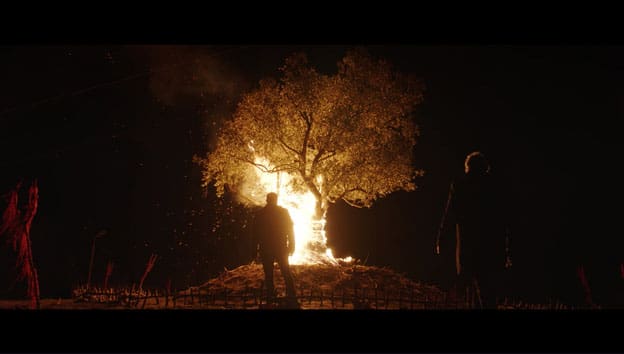
Writer-director Cenk Ertürk’s début film, Noah Land, which premiered at Tribeca tonight, is hard to define. It follows Ömer (Ali Atay), a recently-divorced man who takes his estranged father, Ibrahim (Haluk Bilginer), back to the remote, Turkish town that expelled him 45 years earlier. Dying of cancer, Ibrahim returns to arrange to be buried under a tree he planted as a child.
However, it turns out the tree has since become a religious landmark called the “Noah Tree,” which the locals believe the biblical figure planted after The Flood. As Ömer and Ibrahim fight to have the latter’s deed on the land recognized, they begin to fix their troubled relationship. Given that description, the film could be any number of things: an allegory about Israel and Palestine, a religious fable, an emotional family drama, even an off-beat comedy. Unfortunately, while Ertürk is obviously exploring a lot of big ideas, he doesn’t manage to do so in a narratively satisfying way.
The film’s problems begin immediately, as Ertürk throws the audience in without preamble, doing little to explain how the characters connect or why they act the way they do. Take the first scene with Ömer and Ibrahim. The latter is clearly sick as he struggles to get out of the car and walk into the nearby convenience store, yet Ömer not only doesn’t help him, but uses his absence to jam a piece of gum into the lock of the passenger side door so that his father must sit in the back when he returns. Without the context of their relationship, the move seems unnecessarily cruel and even when we learn more about Ibrahim’s abandonment of Ömer and his mother, it’s difficult to sympathize with him.
That said, Ömer’s hatred toward his father and the way it manifests both in that relationship and other aspects of his life is part of the point. As Ibrahim states, “there is a very fine line between revenge and justice,” and Ertürk is clearly using the character to explore that idea. When it comes to the land dispute over the tree, Ertürk’s intention is clear cut: Ömer rightfully reacts with anger when the townspeople profiting off the Noah Tree threaten them physically and the local government deliberately refuses to turn over the records that would prove Ibrahim’s ownership over the land. And while Ömer’s relationship with his father is understandably more complicated, it’s his relationship with his ex-wife, Elif (Hande Dogandemir), where things really get muddled.
Though we assume from the opening scene that the sad, unnamed elementary school teacher whose window Ömer gazes up at is the ex-wife he keeps talking about, it’s not until she shows up–unannounced and very pregnant–that we know for sure. As the couple shares a pained conversation, Elif confirms what we’ve slowly gathered by watching Ömer: his actions are driven by his hatred for his father and his desperation to prove that he’s not like him. It’s a cruel moment and one the movie desperately needed to give the audience a foothold in understanding why the characters act the way they do, but it’s only heightened by what Ömer says in response.
In essence, he tells Elif that one day, she will apologize to him for what she said and that when she does, he’ll forgive her without the resentment she accuses him of. It’s quite a moment and both actors do powerful emotional work in the scene. However, it just doesn’t land in the way it should because Ertürk hasn’t given the audience the tools to assess either perspective. Sure, we are predisposed to take Ömer’s word because he’s the character we’ve spent the most time with, but what Elif says rings true with what we’ve seen of his behavior. It’s ambiguous and while that is probably part of Ertürk’s goal, it’s also difficult to understand how that moment affects the character developments Ömer experiences after or worse, whether they’ll even matter once his father is dead and the Noah Tree is long forgotten.
While Ertürk may be toying with ideas like life, death, revenge, faith and a half-dozen other big concepts in Noah Land, in the end, his thinking is almost completely impenetrable to the viewer. Sure, that vagueness leaves the viewer to read into Ibrahim and Ömer’s story whatever most speaks to them, but without a more decisive voice in telling us who they are and what they really want, it’s hard to latch onto anything at all.

